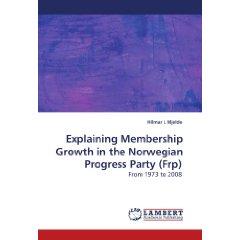Explaining Membership Growth in the Norwegian Progress Party
Hilmar Mjelde, scientific assistant at the Department of Comparative Politics, has published a book on the membership growth in the Norwegian Progress Party (FrP) 1973 - 2008.
Main content
West-European parties, including Norwegian ones, are losing members, and have been doing it for several decades. Although this development was not as pronounced in 1980 it had become clear by 2001. The Norwegian Progress Party has clearly deviated from both the national and the international trend of dwindling mass membership with its relatively stable growth in this respect. Through the application of relevant academic literature, I set forth seven hypotheses about the causes of the Progress Party membership growth. At the macro-level, I examine the impact of electoral success and public subsidies on membership growth. At the meso-level, the efforts of the Progress Party leadership, the party¿s organizational network, and its executive structure are considered. Finally, at the micro-level, I study support in the electorate for the Progress Party¿s policies and the availability of political positions for members in the party as possible causes of membership growth. The central finding of the thesis is that leadership efforts appear to be the key component in the explanation, although it may depend on several other factors to be successful.
